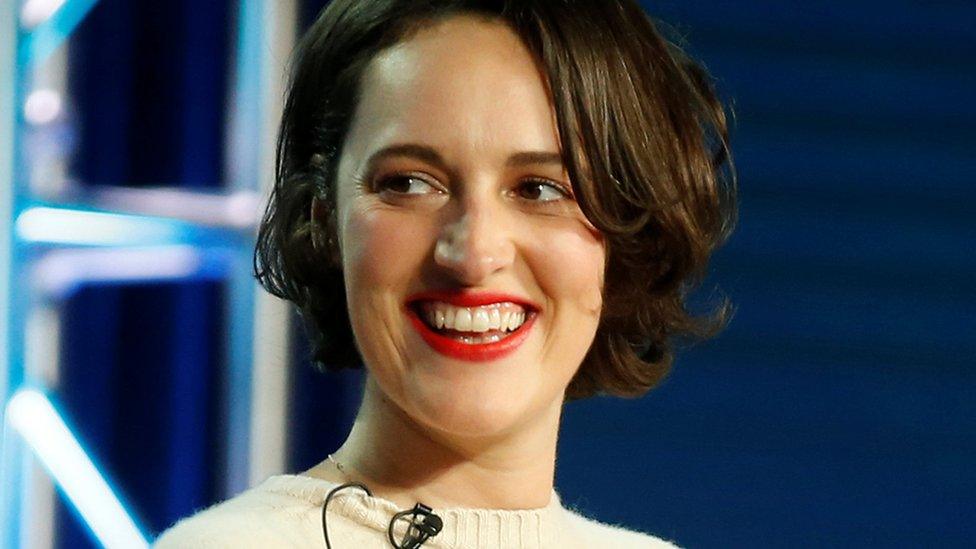Fleabag at the Emmys: How America fell in love with a 'dirty' British comedy
- Published
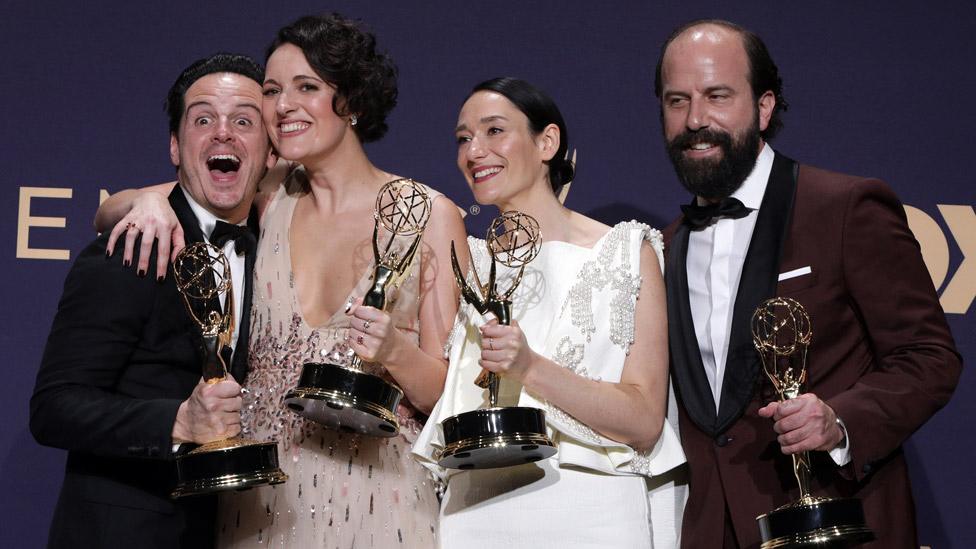
Left-right: Fleabag's Andrew Scott, Phoebe Waller-Bridge, Sian Clifford and Brett Gelman
Fleabag, the savage BBC sitcom written by and starring Phoebe Waller-Bridge, has become the first British show to win best comedy series at the Emmy Awards in the US.
"It's so wonderful and reassuring to know that a dirty, pervy, angry and messed-up woman can make it to the Emmys," joked Waller-Bridge on stage on Sunday - referring to her character, obviously.
She made it, and she won four awards, including best comedy series and comedy actress. In the latter category, she beat the hot favourite, Veep star Julia Louis-Dreyfus, who had triumphed for all six of the show's previous seasons.
Fleabag launched on BBC Three in the UK in 2016, and its first season became a cult hit in the US after being picked up by Amazon. Its second was the breakthrough.
It was "unmissable", Vanity Fair said, external. It was "a raunchy, redemptive masterpiece", Time magazine said, external. It was "thrillingly deep, funny, and buoyant", Slate said, external. It was "a virtuoso performance by an actor at the top of her game", Vox said, external.
Speaking in the Emmys press room after her wins, Waller-Bridge said she had been hugely surprised by the "really special" word-of-mouth response in the US. "It did feel like a tidal wave just suddenly hitting us all," she said. "It just landed and there was this explosion of response. There were shock waves to it."
The fact it's the first British show to win best comedy series is partly down to the changing TV landscape - non-US shows aren't eligible for the Emmys unless they're co-produced by an American company, and global co-productions are more common in the global streaming era. So great British comedies like Fawlty Towers, Monty Python, Absolutely Fabulous and the original The Office couldn't enter.
The second season of Fleabag was co-produced by the BBC and Amazon. It now joins Modern Family, The Marvelous Mrs Maisel and Veep as the shows that have been named best comedy series this decade.
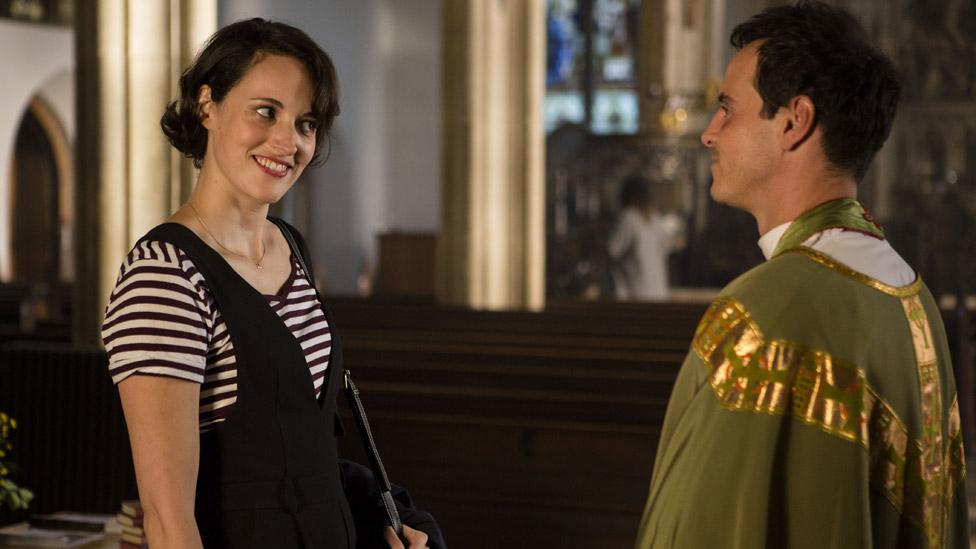
Phoebe Waller-Bridge and Andrew Scott in Fleabag season two
"The headline is, like, it is just a very, very good show, right?" says the New York Times' Eleanor Stanford, who until recently wrote for the TV team and is now a London-based editor on the paper's culture desk.
"There is a baseline appreciation for the craft of the show. But also if you look at the British shows that are really successful in America, I think there's a certain frisson at seeing British people swearing, and being as filthy as Fleabag is."
Veep was created by Armando Iannucci, also a Brit, based on his very sweary BBC political satire The Thick of It. Sunday's other British Emmy winners included Succession writer Jesse Armstrong (who made his name on Channel 4's Peep Show) and Black Mirror episode Bandersnatch, written by Charlie Brooker. Perhaps there's a common theme in the appetite for black, biting British humour and outlook.
"The clichés are of the British being more sarcastic and of the humour having a darker tinge to it," Stanford says. "They are clichés, but there's probably some truth there."
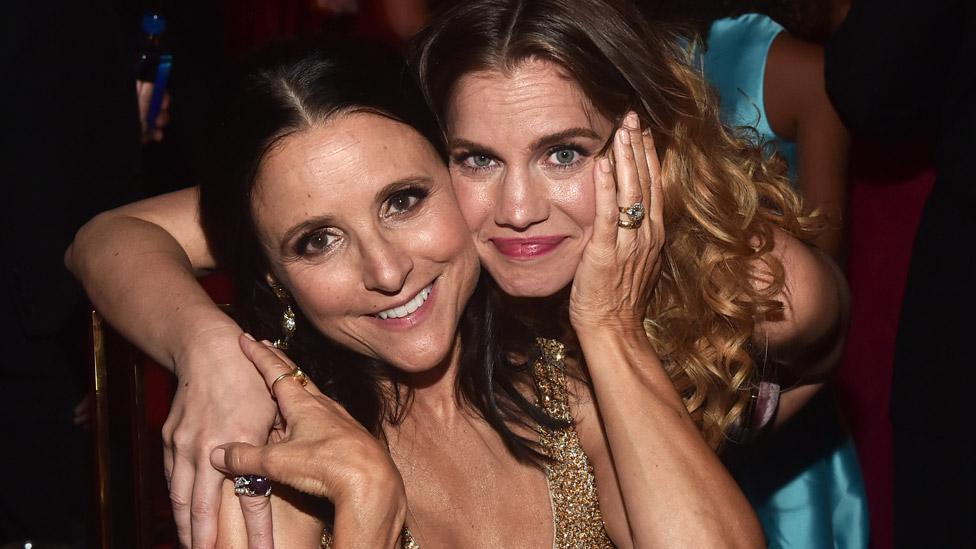
Veep nominees Julia Louis-Dreyfus and Anna Chlumsky consoled each other at the Emmys Governors Ball
Fleabag executive producer Jack Williams, speaking after Emmys night, says of the show: "It does feel very British - the sense of humour, the wryness, the ability to go from very funny to very sad.
"But I suppose it's universal. The feel of the thing is very British, but I think what she's writing about is far broader than that. The writing is just really good."
What often used to happen was that a hit British comedy might get an American remake. (The US version of The Office has also won the Emmy for top comedy.) Now, a show will stream around the world at the same time, so if a show is as good as Fleabag is, Stateside viewers will just discover the original.
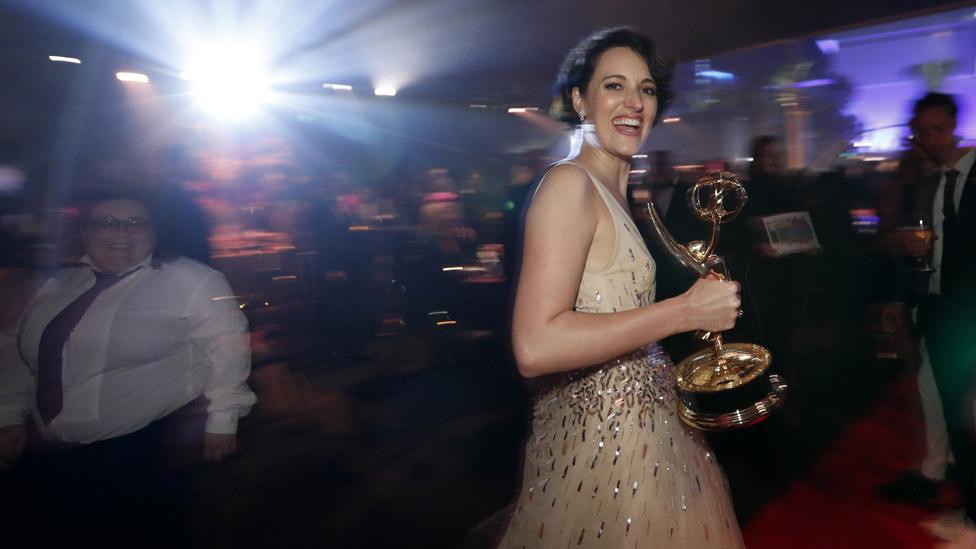
Phoebe Waller-Bridge backstage at the Emmys
"Perhaps five years ago it might have been remade," Williams says. "But because you can go on Amazon and find it in any country in the world, people have managed to find it before that happens."
It has been remade in one country, though. The French title for Fleabag is Mouche, which translates as "Fly". But on the whole, the French version got lost in translation, external.
Like Fawlty Towers, Fleabag has just 12 episodes - while American sitcoms can have 20+ episodes per season, and lots of seasons.
Less can be more. Stanford says lots of American viewers chose not to binge on Fleabag, instead rationing the episodes to one or two per week. "Which is maybe because the episodes are so intense, and it's such a short season," she says.
"There was a sense that with six super concise, really effective episodes - that that format was sort of remarkable and impressive."
American sitcoms also have writers' rooms, whereas Fleabag is from the depths of Waller-Bridge's psyche alone. She has said there will be no third season.
Williams, who runs production company Two Brothers Pictures with brother Harry, says he would be "really surprised" if she changed her mind.
"She puts a lot into them," he says. "It may be six episodes but every frame and every line is toiled over and takes a lot out of her, and if she feels it's a fitting end then who am I to disagree? We have these 12 episodes to enjoy."

Follow us on Facebook, external, or on Twitter @BBCNewsEnts, external. If you have a story suggestion email entertainment.news@bbc.co.uk, external.
- Published23 September 2019
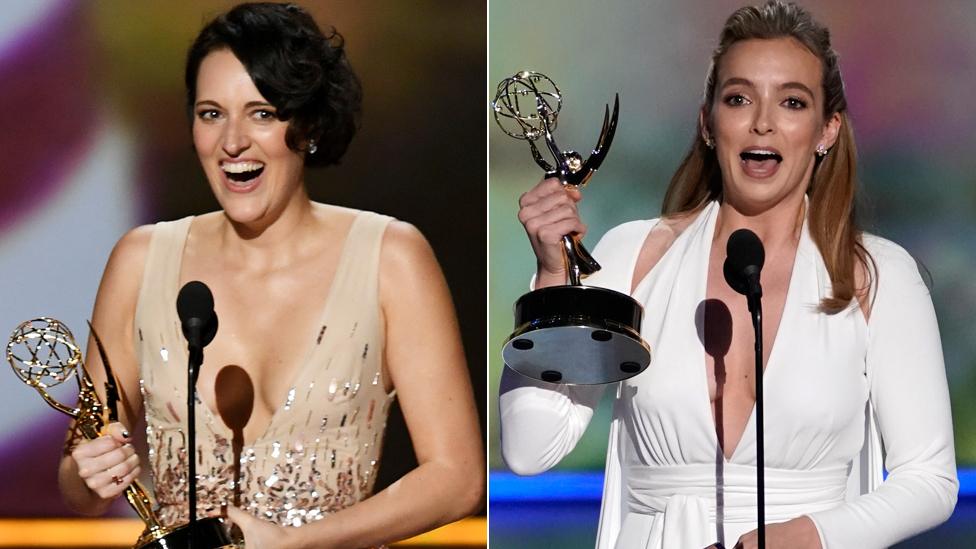
- Published23 September 2019
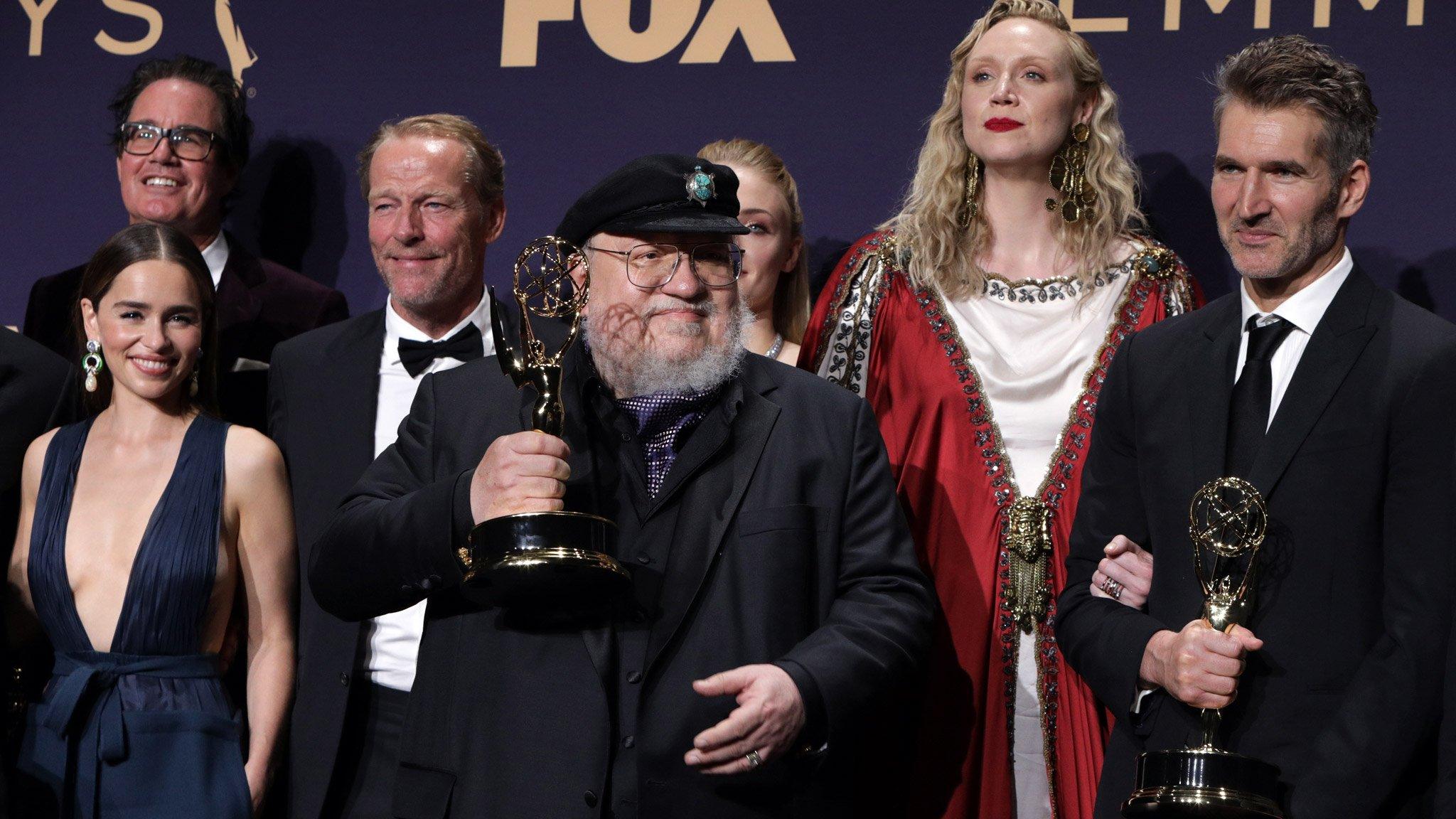
- Published23 September 2019
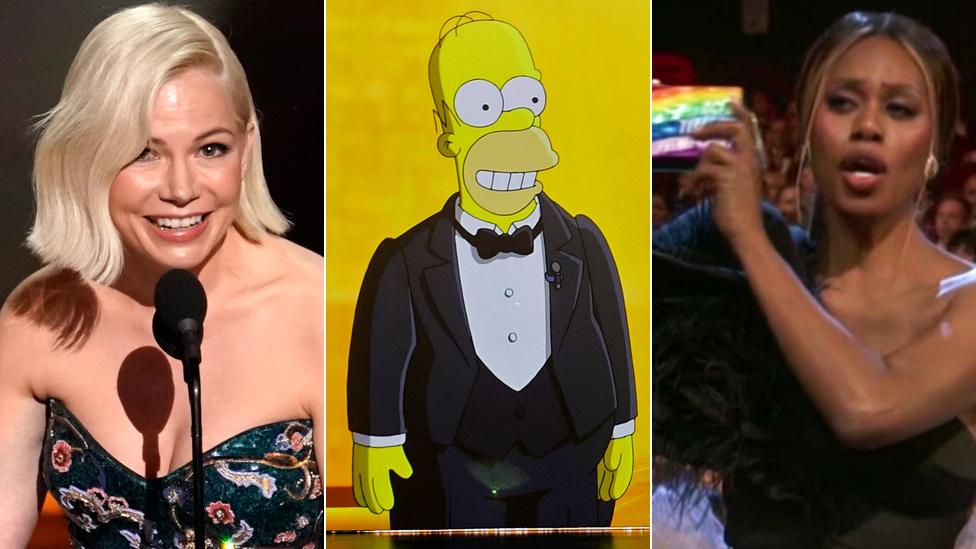
- Published23 September 2019
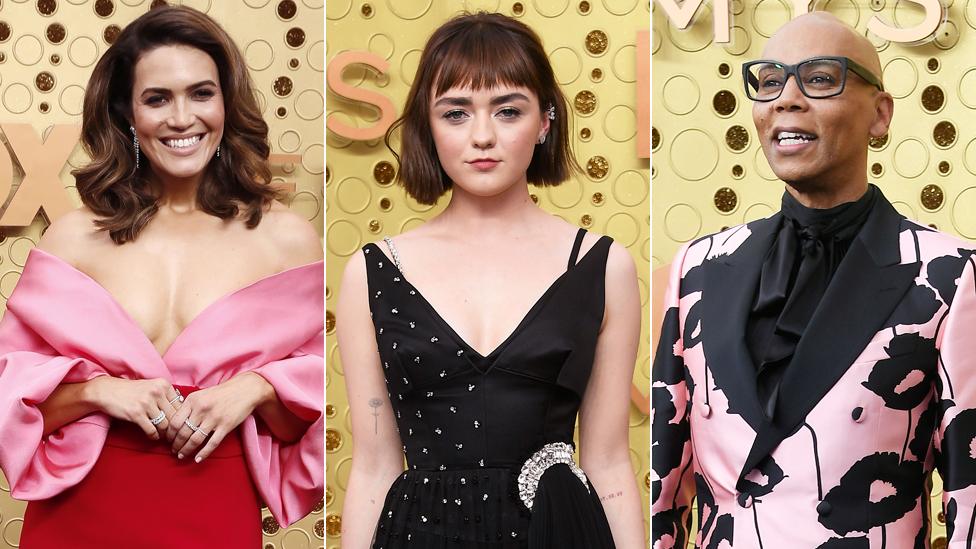
- Published29 August 2019
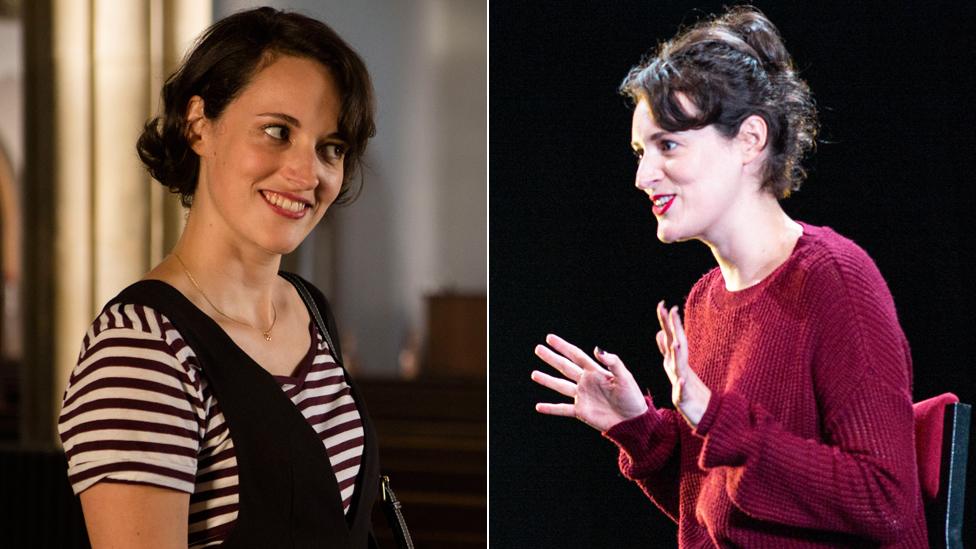
- Published9 April 2019
